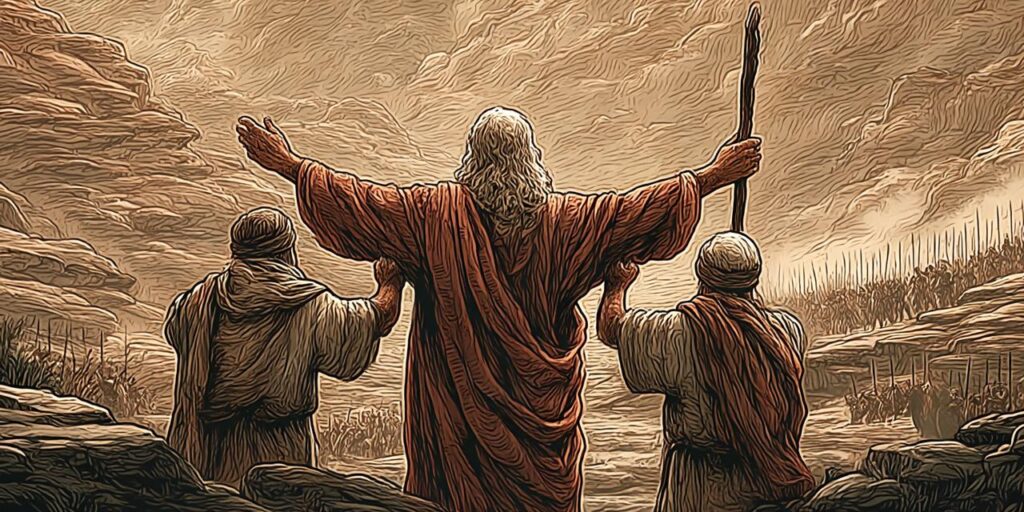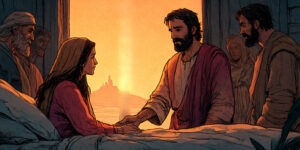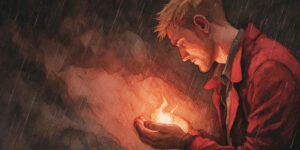
Peace
The gospel claims something bold: God offers real peace. Peace with Him, peace inside yourself, and peace with other people. But that peace isn’t automatic…

Then Amalek came and fought with Israel at Rephidim. So Moses said to Joshua, “Choose for us men, and go out and fight with Amalek. Tomorrow I will stand on the top of the hill with the staff of God in my hand.” So Joshua did as Moses told him, and fought with Amalek, while Moses, Aaron, and Hur went up to the top of the hill. Whenever Moses held up his hand, Israel prevailed, and whenever he lowered his hand, Amalek prevailed. But Moses’ hands grew weary, so they took a stone and put it under him, and he sat on it, while Aaron and Hur held up his hands, one on one side, and the other on the other side. So his hands were steady until the going down of the sun. And Joshua overwhelmed Amalek and his people with the sword.
Then the Lord said to Moses, “Write this as a memorial in a book and recite it in the ears of Joshua, that I will utterly blot out the memory of Amalek from under heaven.” And Moses built an altar and called the name of it, The Lord Is My Banner, saying, “A hand upon the throne of the Lord! The Lord will have war with Amalek from generation to generation.”Exodus 17:8-16
Israel’s first months of freedom read like a classroom: three tests, three stumbles, one gracious rescue after another. Bitter water made sweet. Bread from heaven. Water from a rock. Each scene asked a simple question: Will you complain, or will you trust? The people grumbled; Moses prayed; God provided.
Then came a different test—not provision, but protection. Amalek ambushed the stragglers at the rear, the weary and the slow. Slaves-turned-pilgrims who had never trained for war had to fight. God’s answer fused heaven and earth: Joshua on the field; Moses on the hill; Aaron and Hur at his side.
Moses stood where all could see, staff raised—no magic, just a visible confession: victory belongs to the Lord. When his arms drooped, Israel faltered; when Aaron and Hur braced them, Israel surged. It’s a living parable:
Prayer is real work. Hands grow heavy. Faith must be upheld.
No one wins alone. Even God’s most seasoned servant needed help.
God weaves means and miracles. Swords below, supplication above—both under His command.
The pattern exposes two instincts in us. People complain; leaders pray. Israel murmured at Mara, at hunger, at thirst. Moses carried the frustration upward. Again and again, God met prayer with mercy—sweetened water, daily bread, living water, and now deliverance.
Amalek wasn’t a distant empire but kin—descendants of Esau. Often the fiercest wounds come close to home. Scripture doesn’t whitewash that pain; it names it. Yet even here the lesson holds: God defends His people as they depend on Him and stand together.
At day’s end Moses built an altar and named it Yahweh-Nissi—“The LORD is my banner.” In ancient battles a standard rallied scattered soldiers: Here we gather. Here we receive orders. Here we press on. God Himself becomes that banner—our identity, our center, our rallying point.
Lift prayer, not just effort. We plan, work, and serve—but we do not prevail without raised hands. When your arms shake, let others hold them up.
Refuse solo heroics. Scripture’s heroes are never lone wolves. Moses needed Aaron and Hur; Joshua needed a praying hilltop; the church needs each other.
Protect the stragglers. Amalek preys on the weak. The church must not. We do not “shoot our wounded”; we go back for them.
Obey the strange instructions. March around Jericho? Strike a rock? Hold up a staff? God’s ways may look odd—but they are wise. Obedience beats ingenuity.
Remember and rename. Israel marked the moment with an altar and a Name. We, too, must memorialize God’s rescues so future battles meet fresh courage.
This episode prepares us for a fuller revelation. Later, on Sinai, Moses again interceded for a stiff-necked people—and God again answered by naming Himself:
“The LORD, the LORD, a God merciful and gracious,
slow to anger, abounding in steadfast love and faithfulness,
keeping steadfast love for thousands,
forgiving iniquity and transgression and sin,
but who will by no means clear the guilty.” (Ex. 34:6–7)
What God does in the valley (protects, provides, unites) springs from who God is on the mountain (merciful, faithful, just). Yahweh-Nissi and Yahweh’s Name belong together: the banner we gather beneath and the character we trust when we do.
For Christians, the banner is lifted highest at the cross. There we see prayer, obedience, sacrifice, and victory converging: Jesus intercedes, suffers, and triumphs, not as a lone hero but as the Head who gathers a people. There we learn again what Exodus taught first:
Victory is God’s gift, not our grind.
Unity is our strength, not our similarity.
Love is our signal, not our slogan.
So when opposition rises—outside or inside—find the banner. Call others to it. Lift tired hands together. Work, watch, pray. And when God gives the win, build a memory (a journal line, a shared meal, a simple “Look what the Lord has done”) so the next valley meets a steadier faith.
The Lord is our salvation. The Lord is our banner. Under His Name, and together, we will stand.

The gospel claims something bold: God offers real peace. Peace with Him, peace inside yourself, and peace with other people. But that peace isn’t automatic…

Advent starts by asking us to slow down and look past the distractions. Every culture wraps Christmas in its own extras—traditions, shopping, decorations, sentimental ideas.

After Paul left Galatia, other teachers came. They questioned Paul’s authority and offered the Galatians a far more “comfortable” message…

Jesus leaves the synagogue in Capernaum and steps into a home. Simon Peter’s mother-in-law lies with a high fever.

Paul writes to a church he has never visited, yet he sounds like a pastor who knows them well: he encourages, challenges, and points every road back to Christ…